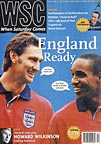 Neil Wills reads Tom Finney's book from 1958 and cannot help but think that, despite certain differences, parts of the game remain the same
Neil Wills reads Tom Finney's book from 1958 and cannot help but think that, despite certain differences, parts of the game remain the same
An evil press fabricates stories to provoke trouble. Players are paid to throw games. England’s administrators are out of touch with reality. Italian football is dogged by too many foreign signings and the chicanery of top industrialists. The skewed allocation of Cup final tickets leads to a healthy market for touts. Fans invade the pitch to assault players, and talk of a European super league continues unabated. Welcome to 1958.
We’re post-Hungary (6-3, 7-1) and Yugoslavia (5-0), but pre-66, and a few brave souls are beginning to consider the possibility that England are no longer masters of the game. Yet football coaching, as opposed to mere fitness training, is still frowned upon as somehow un-English. And it’s true: some big clubs really do not allow their players to see a ball from Wednesday to Saturday. Speed, directness and fight are the three fast-crumbling pillars of the English game and to hell with anything as suspect as ball control.
Sadly, one learns very little from the book about Finney the man, except when he admits that a mid-career injury led to depression (take note, John Gregory) and that the continual comparisons made between him and Stanley Matthews “played havoc with my nerves”. When Preston are desperately staving off relegation he is forced to keep playing despite the fact that he can’t even walk without pain. When his problem is finally diagnosed as sciatica he is basically told to “run it off” – no doubt Stuart Pearce would have approved.
Finney’s ideas on improving the English game range from scrapping promotion and relegation for a few seasons to make football “less frantic”, to a three-division, 54-team league. This must have been highly controversial in its day, particularly as he advocated a two-division “Premier League” which countenanced a very limited admission of a few “star” clubs from the Third Division (such as Norwich and Coventry) and only once “all their credentials had been thoroughly examined”.
Sound familiar? As for the 38 teams suddenly relegated to non-League status, he is unsentimental. “Clubs like Barrow, Gateshead, Southport, Torquay and Gillingham. Would they be missed? I doubt it.” Not much of a socialist, our Tom.
A whole chapter is devoted to the hated maximum wage. The usual points are made – star players being paid the same as journeymen, players going to non-League teams where no maximum wage was in force (meaning that “Wisbech can outbid Wolves” – an idea that admittedly has some charm). He also believes talented young men would be attracted to the game if they thought they could earn £20,000 – that’s over a ten-year career, not every week.
There is no shortage of nuggets for trivia fans. Wilf Mannion had his face cut open against Scotland, fought to get off the stretcher carrying him off, then promptly fainted. Frank Swift, who died in the Munich crash, used to impersonate women undressing and, when playing, had the habit of going behind his goal to chat to fans and eat their toffees. The 1950s even had their own Eric Cantona, in the form of Ivor Broadis, who, after the 7-1 tonking by Hungary, uttered the immortal words, “That’s the first time I’ve ever come off the pitch with a sunburnt tongue.” Poetry.
The press seem almost as ugly as our tabloids. A letter from Billy Wright to his girlfriend, Joy Beverley (of the Sisters), found its way into one newspaper in the middle of the 1958 World Cup. The press also tried to drive a wedge between Finney and Preston’s big signing Eddie Quigley (£26,000 from Southampton) with several fictional stories. The PNE chairman tells him, “I’ll see if I can do something about the press campaign.” It stops immediately, which is rather sinister.
A story the hacks would have loved to have got their hands on, but which was first revealed in the book, concerns the occasion when, in best cloak-and-dagger fashion, Finney is approached in a park by a man “whose face seemed vaguely familiar”. He offers Finney £2,000 (four years’ wages) if he gets himself transfer-listed. The identity of the club who made the offer remains a mystery, though I suspect Finney had a good idea.
And the future? England’s left winger didn’t always get it right (“It is doubtful if Denmark will ever become a great football power”) but he knew enough to foresee that the end of the maximum wage meant clubs with the most resources would dominate (a good thing, to his mind) while warning that “live television of League matches would certainly be akin to the kiss of death”. Will somebody please take note?
From WSC 154 December 1999. What was happening this month